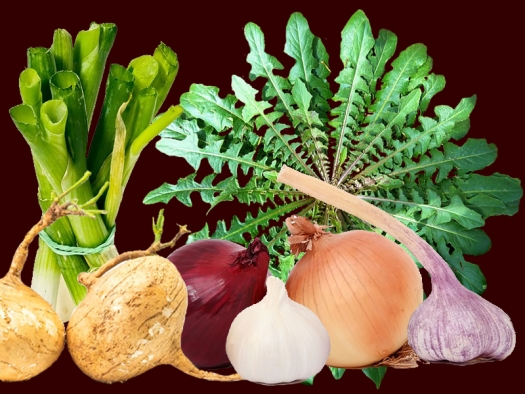Peggy Sarlin's Awakening from Alzheimer's interview with Dr. David Perlmutter
PerlmutterPrebioticVeggies.jpg

Photo collage by FAIM / Source files from Pixabay.com, CC0
Jicama, dandelion greens, onions, garlic, and leeks are good sources of prebiotic fiber.
The brain is exquisitely sensitive to the food we eat. For Alzheimer's we must focus on the fire – being inflammation. Inflammation begins in the gut when the gut lining becomes permeable or leaky. It is the job of the hundred trillion microbes to maintain the integrity of the gut lining. When this gets damaged by our diet and medications, the resulting inflammation affects the brain, heart, immunity, joints and skin. The gram negative bacteria in the gut has a covering called LPS. When LPS is measurable in the blood it means the gut is permeable, LPS is driving inflammation. A dramatic increase in LPS correlates with Alzheimer's, as well as with autism and Lou Gehrig's disease. If you have leaky gut it will affect your cognition.
To keep a healthy gut, cut the carbs, get rid of sugar and eat more healthy fat (extra virgin olive oil, coconut oil, grass-fed beef, wild fish, nuts, seeds and pastured eggs). Do not eat artificial sweeteners, but rather fermented foods like Kombucha, kimchee, and kefir. We need to eat more prebiotic fiber as in vegetables like jicama, dandelion greens, onions, garlic and leeks. You can get the same benefit from acacia gum and baobab fruit.
The gut bacteria plays a role in the manufacture of 90% of our neurotransmitters like serotonin and dopamine. Some say the gut is the second brain. The gut bacteria thrives on prebiotic fiber. Just as the gut barrier can get leaky, so can the brain barrier. A healthy gut makes butyrate which actually helps heal a leaky brain barrier. The type of gut bacteria will determine if weight loss is possible. This matters because the bigger your belly the greater is your risk for Alzheimer's.
Dr. Perlmutter suggests having a 12-16 hour fast period from dinner until breakfast. A high fat diet will offer a sustained energy level. He recommends aerobic exercise to increase heart rate. As for supplements, he recommends probiotics, prebiotics, Vitamin D, alpha lipoic acid, CoQ10, and Vitamin E. Omega 3 DHA is most important for brain health. Vitamin D is vital and is made from cholesterol. To have normal levels we must have adequate cholesterol. The normal range is 30-100 but realistically the level should be at least 60.
He cited Dr. Bredesen's research, summarizing it by saying “so nine of ten patients of whom their Alzheimer's was reversed, that is astounding. This is earth changing. It is a sea change, that finally through leveraging 36 different inputs, including exercise, Vitamin D, lower carb diet, gluten free, higher fat, stress reduction, changing or reducing homocysteine levels, other various interventions, sex hormone modifications, that Dr. Bredesen and his team have published this reversal.” Think what this approach can do for those with only mild cognitive impairment. (See the FAIM article on Dr. Bredesen's protocol.)
Gender was discussed with Dr. Perlmutter making the point that Alzheimer's is much more common in women. More women die from Alzheimer's than breast cancer. If you live to be 85 your chances of having Alzheimer's are 50/50. The encouraging thing is that the risk factors are manageable. We know for the most part, Alzheimer's is preventable – low carb diet, higher good fats, exercise, proper vitamin levels, managing stress, and getting sleep, etc. Alzheimer's is a disease for which there is no treatment, but it is a disease that doesn't have to happen in the first place.
Finally, our health and our longevity, our ability to resist disease, including Alzheimer's is absolutely dependent upon the health of our gut bacteria.


